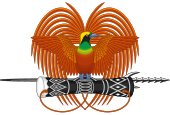 |
|---|
General elections were held in Papua and New Guinea on 2 October 1954. [1]
 |
|---|
General elections were held in Papua and New Guinea on 2 October 1954. [1]
The 29-member Legislative Council consisted of the Administrator, 16 civil servants, nine members appointed by the Administrator (three representatives of the indigenous population, three representing European settlers and three representing missionaries) and three elected Europeans. [2] The Chinese community were also given the right to vote alongside Europeans. [3] However, although there were around 13,000 Europeans and 2,000 Chinese in the territory, only around 2,700 people registered to vote. [1]
The three elected members were elected from three single-member constituencies, New Guinea Islands, New Guinea Mainland and Papua by preferential voting. [4] Voting was not compulsory. [5]
Nominations for the three elected seats closed on 9 August, with five candidates put forward. The New Guinea Islands seat was contested by the incumbent Don Barrett and John Stokie, a plantation manager. In New Guinea Mainland, the incumbent Carl Jacobsen did not run, resulting in a contest between the theatre owner Harry Starr and optometrist and planter George Whittaker. Incumbent MLC Ernest James was the only candidate in Papua. [6]
| Constituency | Candidate | Votes | % | Notes |
|---|---|---|---|---|
| New Guinea Islands | Don Barrett | 408 | 77.9 | Re-elected |
| John Stokie | 116 | 22.1 | ||
| New Guinea Mainland | George Whittaker | 145 | 78.4 | Elected |
| Harry Starr | 40 | 21.6 | ||
| Papua | Ernest James | Unopposed | Re-elected | |
| Invalid/blank votes | 25 | – | ||
| Total | 734 | 100 | ||
| Registered voters/turnout | 1,825 | 40.2 | ||
| Source: Pacific Islands Monthly | ||||
| Position | Member | |
|---|---|---|
| Administrator | Donald Cleland | |
| Civil servants | Chief Collector of Customs | Frank Lee |
| Government Secretary | Steven Lonergan | |
| Chief Native Lands Commissioner | Ivan Champion | |
| Crown Law Officer | Walter William Watkins | |
| Director of Agriculture, Stock and Fisheries | R.E.P. Dwyer | |
| Director of District Services and Native Affairs | Alan Roberts | |
| Acting Assistant Director of District Services and Native Affairs | John Rollo Foldi | |
| Director of Education | William Groves | |
| Director of Forests | James Bannister McAdam | |
| Director of Health | John Gunther | |
| District Commissioner for Central District | Sydney Elliott-Smith | |
| District Commissioner for Madang | R.W. Wilson | |
| District Commissioner for Morobe | Horrie Niall | |
| District Commissioner for New Britain | John Keith McCarthy | |
| Secretary of Lands, Surveys and Mines | Douglas Macinnis | |
| Treasurer and Director of Finance | Harold Reeve | |
| Representatives of Europeans | Doris Booth | |
| Robert Bunting | ||
| Basil Fairfax-Ross | ||
| Representatives of Natives | Merari Dickson | |
| Pita Simogun | ||
| John Vuia | ||
| Representatives of Missionaries | James Dwyer | |
| Frank George Lewis | ||
| David Eric Ure | ||
| Source: Pacific Islands Monthly, Institute of Commonwealth Studies [7] | ||
In March 1955 Frank Lee was replaced by Thomas Grahamslaw. [8] Later in the year missionary representative Frank George Lewis left the territory and was replaced in the Council by Philip Strong. [9]
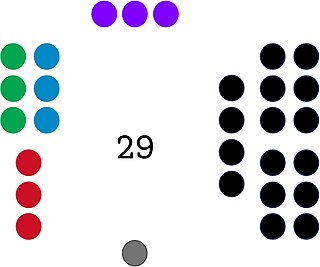
The Legislative Council of Papua and New Guinea was a legislative body in Papua New Guinea between 1951 and 1963. It was established by the Papua and New Guinea Act 1949 of Australia, which provided for the combined administration of the Territory of Papua and Territory of New Guinea under the United Nations trust territory system. It had the power to make Ordinances for the "peace, order and good government" of the territory, subject to the assent of the Australian-appointed Administrator.
Nicholas Brokam was a Papua New Guinean politician. He was a member of the Legislative Council and House of Assembly between 1961 and 1968, also serving as Under-Secretary for Economic Affairs and Information and Extension Services.
Sir Hugh Hall Ragg was a Fijian businessman and politician. He served as a member of the Legislative Council between 1926 and 1950.

General elections were held in the Territory of Papua and New Guinea between 19 February and 11 March 1972. They saw the election of the country's first female MP, Josephine Abaijah.

General elections were held in Papua and New Guinea for the first time on 10 November 1951.

General elections were held in Western Samoa on 15 November 1957.

General elections were held in Papua and New Guinea on 31 August 1957.
George Kenneth Whittaker was an Australian optometrist, planter, soldier and politician in Papua New Guinea.

By-elections for all three elected seats in the Legislative Council were held in Papua and New Guinea on 12 September 1959. The incumbent MLCs had resigned due to the imposition of income tax in the territory by the Australian government. All three seats were won by candidates supported by the Taxpayers' Association. The three new MLCs all resigned by 1 October.

General elections were held in Papua and New Guinea on 27 August 1960.

General elections were held in the Territory of Papua and New Guinea on 18 March 1961. Indigenous members were elected for the first time, although on an indirect basis. The territory's first political party, the United Progress Party, won three seats.
Carl Mallesch Jacobsen was an Australian-born politician and farmer who served as a member of the Legislative Council of Papua and New Guinea between 1951 and 1954.

General elections were held in the Territory of Papua and New Guinea between 15 February and 15 March 1964. They were the first elections in the territory held under universal suffrage. Voter turnout among enrolled voters was 65%.
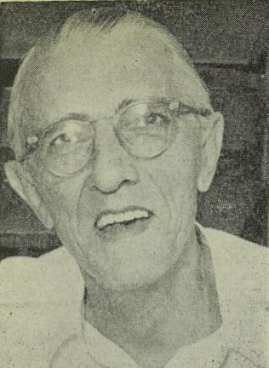
Ernest Alfred James was an accountant, newspaper proprietor and politician in the Territory of Papua New Guinea. He served as a member of the Legislative Council between 1951 and 1959.

Legislative Council elections were held in the Cook Islands in 1947, the first after the establishment of the new legislature.
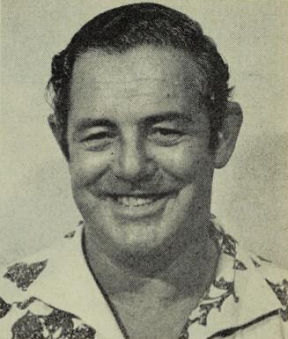
Donald Barrett was an Australian planter, army major, politician and sports coach in the Territory of Papua and New Guinea. He served as a member of the Legislative Council and House of Assembly in two spells between 1951 and 1968.
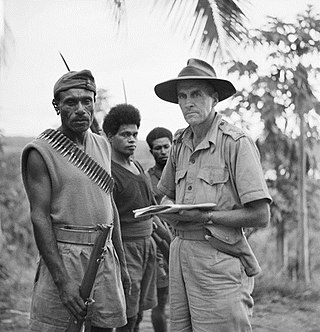
Thomas Grahamslaw was an Australian public servant. He spent most of his life in Papua and New Guinea, where he worked as a civil servant and served as an official member of the Legislative Council.
John Lester Chipper was an English-born Papua New Guinean businessman and politician. He served in the Legislative Council in two spells between 1959 and 1964 and headed the local council of Rabaul for several years.
Oala Oala-Rarua was a Papua New Guinean educator, civil servant, trade unionist, politician and diplomat. He served as a member of the House of Assembly and Assistant Minister for the Treasury between 1968 and 1972, later becoming the first Lord Mayor of Port Moresby and High Commissioner to Australia.

Sir Pita Simogun was a Papua New Guinean policeman, farmer and politician. He served as a member of the Legislative Council from 1951 to 1961 and then as a member of the House of Assembly from 1964 to 1968, during which time he was also Parliamentary Under-Secretary for Police.